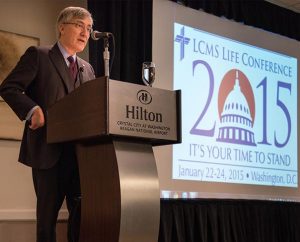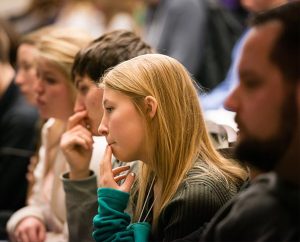By Megan K. Mertz
ARLINGTON, Va. — The Christian’s role in the public square, the link between abortion and breast cancer, and ways to engage youth in the pro-life movement were among the topics discussed at the second LCMS Life Conference Jan. 23-24 at the Crystal City Hilton Hotel here.
Some 330 Lutherans attended the conference, which followed the 2015 March for Life, held the previous day in Washington, D.C. Nearly half of those in attendance were high-school or college students.
Engaging in the public square
LCMS President Rev. Dr. Matthew C. Harrison gave the first presentation of the conference on the Lutheran two-kingdoms doctrine. He explained the two realms mentioned in the Bible — the civil realm and the realm of the Church — and discussed Article XVI of the Augsburg Confession, which encourages Christians to serve in government and the military, among other things.

“We do not seek to Christianize government; we want Christians in government,” Harrison said. “To be sure, our Christian convictions and others’ religious convictions will inform how we operate. They will inform our reason when we operate in government. But we want government to operate reasonably.”
In the next session, Robert P. George, professor of Jurisprudence at Princeton University and chairman of the U.S. Commission on International Religious Freedom, continued the discussion of the Christian’s role in the public square, especially on the issues of life and marriage.
“There’s a profound truth … about the nature of the human being,” he said.
George noted that a human being is the same genetically complete individual throughout his or her entire life, whether in the womb, fully grown or near death. He also expounded on the purpose of marriage, pointing out that unlike the other systems in the human body, a reproductive system needs both a man and a woman to be complete and fully functioning.
“We as believers have every bit as much a right to bring our religiously inspired convictions about justice and the common good into the public square and to advocate for the allegiance of our fellow citizens as any atheist does, as any unbeliever does. … No more, but also no less,” George said. “The playing field under our Constitution, properly interpreted, is even. Let’s go out there and have the debate.”
Advocating for women, children
The idea of standing up for the unborn and for those who can’t speak for themselves permeated the conference presentations.

Dr. Donna Harrison, a board-certified OB-GYN and executive director of the American Association of Pro-life Obstetricians and Gynecologists, spoke about the short- and long-term effects of abortion on women.
According to Harrison, while the short-term risks of abortion — hemorrhage, infection, surgical complications, incomplete abortion or death — are similar to those of any surgery, medical studies demonstrate that the long-term risks are far more profound.
“Aborting a first pregnancy, especially for teens or women over 30, increases the risk for breast cancer,” she said. “The more abortions before the first-term pregnancy, the higher the risk.”
Other significant long-term effects include increased risk of pre-term birth in subsequent pregnancies, as well as increased risk for suicide, substance abuse and depression.
“When we talk about abortion and its effect on women, you have to really step back,” she said. “We have to also look at what happens in their life afterward in the long term. There is a better choice for women.”
During her presentation, Carol Tobias, president of the National Right to Life Committee, encouraged attendees to contact their legislators on important issues like abortion and to speak up in the public forum to educate others.
Mollie Ziegler Hemingway, a journalist and senior editor at The Federalist, also encouraged those in attendance to look for opportunities in their daily lives to advocate for pro-life issues.
“Everybody has opportunities to advocate, no matter what your vocation is,” she said. “I think it’s important that we think about how, through our vocations, we have these relationships with other people in our family, among our close friends or even among anybody that we’re interacting with from day to day, and that is the most effective place to advocate for people who can’t advocate for themselves.”
Inspiring action
Lila Rose, president of Live Action, a nonprofit dedicated to ending abortion and building a culture of life, and Laura Davis, director of Lutherans For Life’s youth initiative, Y4Life, shared their personal stories about how they were inspired to join the pro-life movement at a young age.
Rose talked about how horrified she was when she first learned about abortion when she was only 9 years old and how that later inspired her to begin Live Action.
“My path would end up having me travel internationally, go undercover at abortion clinics, debate on TV against pro-abortion people. I never imagined those things as a teenager, starting Live Action in my living room with a couple friends,” she said.
“It wasn’t my plan for my life. It was just, ‘OK, God, use me. Use me to do something about abortion. Use me to somehow save some lives.’ That was my prayer as a teenager.”
The next day, Davis reminded both the adults and young people in attendance that youth aren’t only leaders in the future, they are leaders now. What youth need, she said, are personal invitations to get involved, mentorship and opportunities for action.
“I would never be where I am today if it weren’t for that personal invitation from my pastor,” Davis said. “He sought me out, he connected me with a ministry opportunity and he encouraged me to take a chance.”
Bethany Gillet, a sophomore at St. Paul Lutheran High School in Concordia, Mo., called the speakers “role models.”
“Before I came, I knew about abortion and I knew what happened, but I never really grasped the idea,” she said. “But now I understand it a lot better than I did. It’s heart-wrenching.”
Hannah Bernhardt, a senior at Lutheran High School of St. Charles County, Mo., who came with a group of 40 students, said the March for Life and LCMS Life Conference “really hit home” and gave her ideas for use in her high school’s pro-life club.
“We want to go out and get more people from our churches to get involved and really take Pastor Harrison’s words to heart saying that we need to get more Lutherans here,” she said.
During the conference, attendees also heard from the Rev. Dr. Jeffrey A. Gibbs, professor of New Testament at Concordia Seminary, St. Louis, and had the opportunity to learn more about Lutherans For Life and A Place of Refuge Ministries, two pro-life LCMS Recognized Service Organizations.
“One of the great things here was seeing the number of people in the LCMS who are such wonderful resources,” said the Rev. Donald Fondow, president of the LCMS Minnesota North District, who attended both the March for Life and the LCMS Life Conference. “I think one of the most important things is to get the message out into the pew about the sanctity of life and how that pervades all of life because it’s all about the Lord Jesus.”
To see more photos from the LCMS Life Conference, click here.
To read an LCMS statement on the 42nd anniversary of Roe v. Wade, click here.
Megan K. Mertz (megan.mertz@lcms.org) is a staff writer with LCMS Communications.
Posted Feb. 2, 2015



